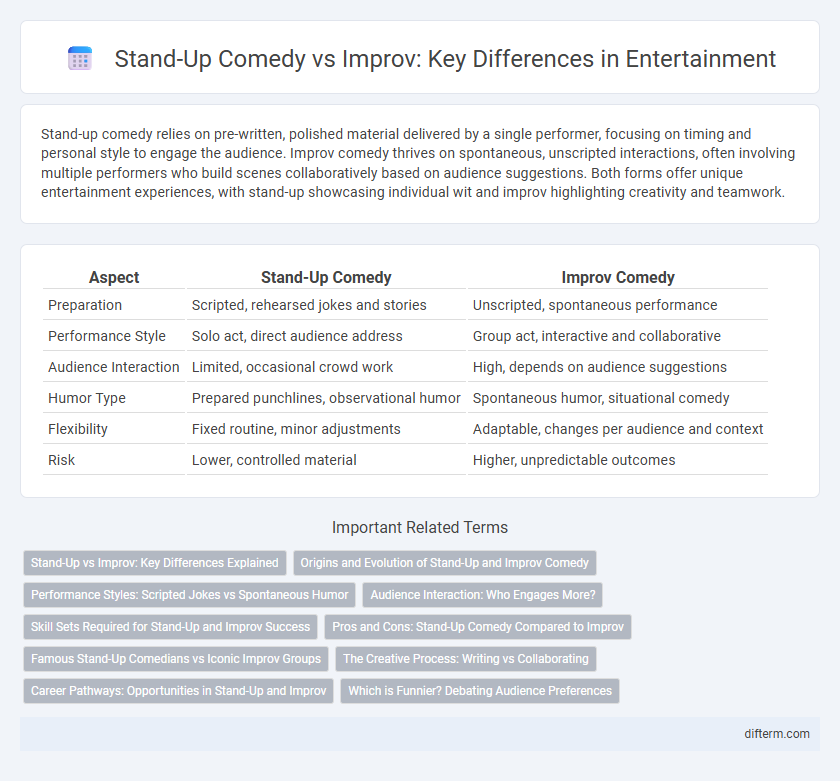Stand-up comedy relies on pre-written, polished material delivered by a single performer, focusing on timing and personal style to engage the audience. Improv comedy thrives on spontaneous, unscripted interactions, often involving multiple performers who build scenes collaboratively based on audience suggestions. Both forms offer unique entertainment experiences, with stand-up showcasing individual wit and improv highlighting creativity and teamwork.
Table of Comparison
| Aspect | Stand-Up Comedy | Improv Comedy |
|---|---|---|
| Preparation | Scripted, rehearsed jokes and stories | Unscripted, spontaneous performance |
| Performance Style | Solo act, direct audience address | Group act, interactive and collaborative |
| Audience Interaction | Limited, occasional crowd work | High, depends on audience suggestions |
| Humor Type | Prepared punchlines, observational humor | Spontaneous humor, situational comedy |
| Flexibility | Fixed routine, minor adjustments | Adaptable, changes per audience and context |
| Risk | Lower, controlled material | Higher, unpredictable outcomes |
Stand-Up vs Improv: Key Differences Explained
Stand-up comedy centers on a solo performer delivering pre-written jokes and personal anecdotes to engage the audience, emphasizing punchline timing and individual style. Improv comedy involves spontaneous, unscripted scenes created collaboratively by a group, relying heavily on audience interaction and quick thinking. Key differences include structure, with stand-up following a scripted routine and improv thriving on in-the-moment creativity and adaptability.
Origins and Evolution of Stand-Up and Improv Comedy
Stand-up comedy traces its origins to ancient storytelling traditions and vaudeville acts, evolving into a solo performance art centered on scripted jokes and personal anecdotes. Improv comedy developed from theatrical improvisation techniques in the early 20th century, emphasizing spontaneous, unscripted scenes and audience interaction. Both forms have continuously influenced each other, shaping contemporary comedy with stand-up's structured punchlines and improv's dynamic creativity.
Performance Styles: Scripted Jokes vs Spontaneous Humor
Stand-up comedy relies on scripted jokes carefully crafted and rehearsed to deliver precise timing and punchlines. Improv comedy thrives on spontaneous humor, with performers reacting in real-time to audience input and fellow actors, creating unpredictable and organic scenes. The contrast highlights stand-up's structured narrative against improv's fluid, collaborative creativity in entertainment performance styles.
Audience Interaction: Who Engages More?
Stand-up comedy primarily relies on the comedian delivering prepared material with occasional audience reactions, resulting in limited direct interaction. Improv comedy thrives on spontaneous audience engagement, where performers often incorporate suggestions and respond dynamically to crowd input. This real-time interaction in improv creates a more immersive and participatory experience for the audience compared to the relatively passive role during stand-up shows.
Skill Sets Required for Stand-Up and Improv Success
Stand-up comedy demands sharp writing skills, precise timing, and the ability to connect with the audience through a carefully crafted routine. Improv requires quick thinking, adaptability, and seamless collaboration with fellow performers to create spontaneous humor. Both art forms necessitate strong stage presence and emotional intelligence to engage audiences effectively.
Pros and Cons: Stand-Up Comedy Compared to Improv
Stand-up comedy allows performers to deliver tightly crafted jokes with precise timing, offering greater control over material and audience reaction, but it demands extensive solo preparation and can be less flexible in adapting to live feedback. Improv emphasizes spontaneity and collaboration, enabling quick thinking and dynamic audience interaction, yet it carries the risk of jokes falling flat without scripted structure and requires strong teamwork skills. Both formats develop unique comedic talents, with stand-up honing individual storytelling prowess and improv enhancing creative adaptability and group synergy.
Famous Stand-Up Comedians vs Iconic Improv Groups
Famous stand-up comedians like Dave Chappelle and Ali Wong have crafted individual personas and finely tuned monologues that resonate worldwide, highlighting the power of scripted humor. Iconic improv groups such as The Second City and Upright Citizens Brigade excel in spontaneous, collaborative performances that adapt to audience reactions, showcasing creativity in real-time. The distinct approaches emphasize stand-up's reliance on personal narrative and improv's strength in collective, unscripted comedy.
The Creative Process: Writing vs Collaborating
Stand-up comedy involves a meticulous writing process where comedians craft and refine jokes independently to ensure precise timing and punchlines. Improv relies heavily on spontaneous collaboration, requiring performers to build on each other's ideas in real-time, fostering creativity through group dynamics and quick thinking. Both formats demand creativity but differ significantly in their approach to content creation and audience engagement.
Career Pathways: Opportunities in Stand-Up and Improv
Stand-up comedy offers solo performers direct control over their material and pacing, often leading to opportunities in television specials, late-night talk shows, and writing gigs. Improv comedians develop strong collaborative skills and quick thinking, opening pathways in sketch comedy, theater, and roles requiring adaptability, such as commercial acting or writers' rooms. Both disciplines provide networking channels within entertainment hubs like Los Angeles and New York, crucial for advancing careers in film, television, and digital media.
Which is Funnier? Debating Audience Preferences
Stand-up comedy often relies on scripted jokes and personal anecdotes, delivering a structured and polished performance that appeals to fans who appreciate clever wordplay and timing. Improv comedy, by contrast, thrives on spontaneous creativity and audience interaction, creating unique, unpredictable moments that resonate with viewers seeking fresh, dynamic humor. Audience preferences vary widely, with some valuing the reliability of a well-crafted set while others prefer the raw, immediate laughter generated by improvisational wit.
stand-up vs improv Infographic

 difterm.com
difterm.com